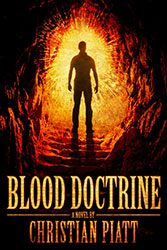 It’s worth stating up front that author and progressive Christian blogger Christian Piatt’s first novel Blood Doctrine will undoubtedly ruffle some church-going feathers. Here is the basic premise: Jesus has come back to earth as a genetically-revived clone named Jacob who—while bearing the stigmata and wielding miraculous powers to heal wounds and raise the dead—is also a slightly foul-mouthed, orphaned young man who spends his days in various states of undress with his latest love interest Elena, hanging out with his usually-stoned friend Allen, playing his beloved saxophone, or working at a record store.
It’s worth stating up front that author and progressive Christian blogger Christian Piatt’s first novel Blood Doctrine will undoubtedly ruffle some church-going feathers. Here is the basic premise: Jesus has come back to earth as a genetically-revived clone named Jacob who—while bearing the stigmata and wielding miraculous powers to heal wounds and raise the dead—is also a slightly foul-mouthed, orphaned young man who spends his days in various states of undress with his latest love interest Elena, hanging out with his usually-stoned friend Allen, playing his beloved saxophone, or working at a record store.
Marketed as a suspense/thriller for young adults, Blood Doctrine has the feel of a Dan Brown novel, and with its nonchalance towards rough language, extramarital sex (between the Jesus clone and his lock-picking lover nonetheless!), and violence assuredly strays outside the norms of a typical Christian novel in this genre. The narrative follows three different interwoven story lines: the post-crucifixion tale of Jesus’s disciples and their martyrdoms; the investigative reporting adventure of New Yorker religion beat writer Nica who has gotten wind of Jacob’s existence and wants to make a story of it; and Jacob’s story itself, which comes about as a result of the elaborate scheming by a group called The Project who—by using DNA from Jesus found on an ancient relic—have created His clone in hopes of bringing about the Second Coming on their own terms.
The fast pace and brief episodic organization of Blood Doctrine make it a quick read, and the sheer unexpectedness of the plot twists will keep readers rapidly turning the pages. The story should not be written off as all speed though: several pause-worthy moments where Piatt’s historical research is evoked really shine. In the description of the burial wrappings placed on Jesus’ crucified body and in the depiction of the landscape and culture of the Essenes in Qumram, Piatt’s attention to detail make the biblical age come vividly alive, a welcome counterpoint to a narrative that otherwise thrills at high speed.
 When interviewed, Piatt asserted that his hope for Blood Doctrine was to create a tale just grounded in reality enough to have potential believability, and indeed, as Piatt forces his readers to consider what humanity might actually do with Jesus’s DNA if we were to recover it, we have to wonder if a fringe religious group attempting to bring about the Second Coming by cloning Jesus is so far outside the realm of possibility. However, even as I am sure that Piatt’s personal speculation about what Jesus’s 21st century clone might look like will appear radical, shocking, and heretical to some, I couldn’t help but wonder if it wasn’t even nearly radical enough! As a follower of Jesus myself, when I speculate on what God’s DNA might look like if used in a human clone, I imagine something perhaps much more strange, unexpected, and extraordinary than a boy whose only apparent divine traits are the traditional stigmata and the ability to perform miracles. This seems undoubtedly the most likely turnout, but when has God’s work ever been likely?
When interviewed, Piatt asserted that his hope for Blood Doctrine was to create a tale just grounded in reality enough to have potential believability, and indeed, as Piatt forces his readers to consider what humanity might actually do with Jesus’s DNA if we were to recover it, we have to wonder if a fringe religious group attempting to bring about the Second Coming by cloning Jesus is so far outside the realm of possibility. However, even as I am sure that Piatt’s personal speculation about what Jesus’s 21st century clone might look like will appear radical, shocking, and heretical to some, I couldn’t help but wonder if it wasn’t even nearly radical enough! As a follower of Jesus myself, when I speculate on what God’s DNA might look like if used in a human clone, I imagine something perhaps much more strange, unexpected, and extraordinary than a boy whose only apparent divine traits are the traditional stigmata and the ability to perform miracles. This seems undoubtedly the most likely turnout, but when has God’s work ever been likely?
I was consequently intrigued to find out that in the editing process, Piatt’s work was cut in half length-wise and that there are additional plans for a trilogy. I can’t help but wonder if what was cut might have shed light on Piatt’s vision for why exactly Jacob became the way he did, why the combination of human and divine DNA created this particular creature. And even more so perhaps than a desire to be given more reasons to care about, understand, and love the Jacob character, the two last minute plot twists will certainly sit much more easy if readers might be provided more insight into what—beyond their clear and effective shock value—Piatt takes these twists to mean. Not to mention that we are left to wonder what we as readers are to do with the attachments we have developed with the other characters. And how—after all the climactic drama of the Jacob story—are we to find closure or meaning in the narrative thread centered on Jesus’s disciples, which ends abruptly with a violent turn of events. Will that tale ever more than indirectly intersect with Jacob’s? The promise of a trilogy leaves hope that such loose ends might not go permanently untied.
While Piatt justifies his controversial subject matter by asserting that his hope is simply that “people walk away feeling provoked, entertained and wanting more”—an ambition some readers will undoubtedly find too low a bar for Christian fiction—Piatt will assuredly meet his goal. Though, in an age where fictional representations of Jesus; provocative and extra-biblical speculations about his life; and constant attempts to disprove, challenge, or reject the validity of scripture remain popular, I have to wonder whether a Christian writer does well to add fuel to the fire. I will, out of sheer curiosity and a desire to discover answers to lingering questions, be reading any subsequent books that come out in the Blood Doctrine series.
Read an excerpt, and listen to an author reading, from Blood Doctrine at the Patheos Book Club here.
 Amber M. Stamper holds a Ph.D. in English (Rhetoric and Composition) and is an Assistant Professor of Language, Literature, and Communication at Elizabeth City State University in North Carolina. Her research and publications center on religious rhetoric and communication, especially issues of Christian evangelism and the digital church.
Amber M. Stamper holds a Ph.D. in English (Rhetoric and Composition) and is an Assistant Professor of Language, Literature, and Communication at Elizabeth City State University in North Carolina. Her research and publications center on religious rhetoric and communication, especially issues of Christian evangelism and the digital church.












